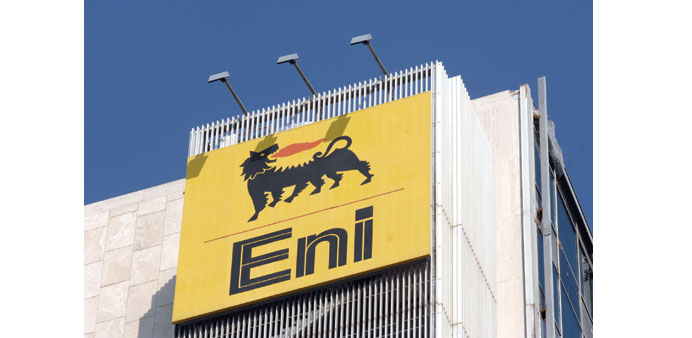The Eni headquarters in Rome. The oil major cut its dividend and suspended a share buyback programme last week, becoming the first oil major to reduce payouts after a steep oil price fall in a bid to save funds to spur future production growth.
Reuters
Milan/London
Italy’s Eni cut its dividend and suspended a share buyback programme on Friday, becoming the first oil major to reduce payouts after a steep oil price decline in a bid to save funds to spur future production growth.
In the first major business plan of Chief Executive Claudio Descalzi, Italy’s biggest listed company said it would pay a 2015 dividend of €0.8 per share, compared with the €1.12 per share it paid on 2014 results.
The state-controlled oil major also said it would cut investments by 17% in the 2015-2018 period to around €48bn ($50bn) and sell assets worth €8bn, 70% of which will be put up for sale before 2016.
Eni shares fell more than 6% before recouping some of those losses and ending down 4.6%.
“Everyone was convinced they’d do all they could to keep the dividend steady,” said Roberto Lotici, fund manager at Ifigest. “The capex cuts and intensity of the assets sales are also a cause for concern,” he added.
The slump in oil prices since June is testing the ability of listed oil companies to support cash flows and has sparked a rush to cut costs across the sector.
Many big oil firms have announced cuts of 10 to 15% to their spending budgets and some have suspended share buybacks.
But most consider high dividends as sacrosanct and investors have said the payouts are the main factor supporting the stocks of major oil firms.
Oil prices collapsed to as low as $46 per barrel in January from peaks last year of $115. Prices have recovered somewhat since January and Brent crude was trading at $56 per barrel on Friday.
Companies like BP and Shell said they would do their utmost to continue paying high dividends and would rather cut operating and capital expenditure (capex), sell assets and increase borrowing than reduce payouts.
When asked in January if Eni would cut dividends, Descalzi told Reuters in January he was confident the company would be able to navigate the low oil price environment.
Until now, Eni has had a dividend yield of 6.8% versus a peer mean of 5.4%, raising concern it had become too stretched in a low oil-price world as the group restructures and sells businesses.
The company, which under Descalzi is increasingly shifting its focus to upstream exploration and production activity, said it was targeting annual output growth of 3.5% in 2015-2018, up from the 3% growth in its previous 2014-2017 plan.

